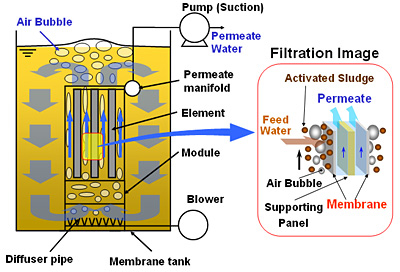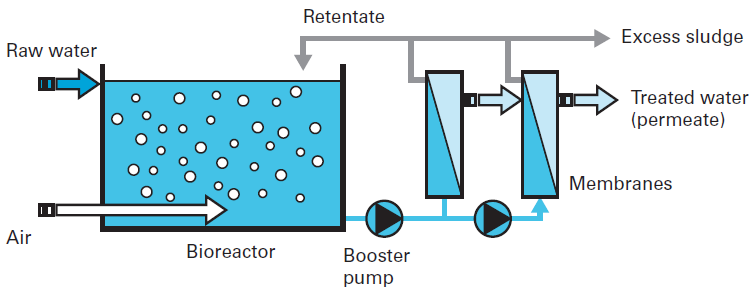Why Membrane Bioreactor is the Future of Wastewater Treatment in Industries
Why Membrane Bioreactor is the Future of Wastewater Treatment in Industries
Blog Article
How Membrane Layer Bioreactors Are Revolutionizing Water Purification Equipments
The emergence of membrane bioreactors (MBRs) stands for a considerable improvement in the field of water purification, merging biological therapy procedures with innovative membrane layer purification technologies. As international water deficiency escalates, the role of MBRs in helping with safe and clean water reuse and lasting water management comes to be progressively vital.
Review of Membrane Bioreactors
Membrane bioreactors (MBRs) represent a significant development in water filtration innovation, as they integrate biological therapy processes with membrane layer filtering. This integration boosts the performance of wastewater treatment by utilizing microbes to degrade organic toxins while all at once utilizing semi-permeable membrane layers to different cured water from suspended solids and pathogens.
The MBR system generally contains an organic activator where the microbial population metabolizes contaminants, adhered to by a membrane layer filtration unit that preserves biomass and allows only clean water to pass through. This twin performance results in higher effluent high quality contrasted to traditional therapy methods. MBRs can be run in both batch and constant circulation settings, using adaptability in layout and application.
They likewise allow the recuperation of water for reuse, hence contributing to water sustainability campaigns. Generally, MBRs are at the center of improving water therapy effectiveness and top quality, showcasing the possibility for ingenious options in ecological management.
Advantages of MBR Technology
The assimilation of organic therapy with membrane filtering supplies countless benefits for water filtration processes. Among the main advantages of Membrane Bioreactor (MBR) technology is its capacity to successfully eliminate both natural and not natural contaminants, leading to top notch effluent. The membrane layers function as a physical barrier, stopping suspended solids and virus from passing through, which boosts the total safety and integrity of treated water.
Additionally, MBR systems need a smaller sized impact compared to standard therapy methods, enabling a lot more effective area use. This compact design is particularly advantageous in metropolitan setups where land is restricted. MBRs likewise demonstrate functional flexibility, fitting differing influent qualities and flow prices without significant performance deterioration.
In addition, the process provides enhanced nutrient elimination abilities, specifically for nitrogen and phosphorus, which are essential for protecting against eutrophication in receiving waters. The decreased sludge manufacturing related to MBR modern technology also converts to decrease disposal costs, making it an affordable remedy over time - Membrane Bioreactor. Generally, the advantages of MBR innovation setting it as a leading choice for sustainable and innovative water purification systems, dealing with both ecological and financial problems
Applications in Water Purification
Applications of Membrane Bioreactor (MBR) innovation in water filtration are impactful and diverse, attending to numerous therapy needs throughout several fields. MBRs effectively integrate organic treatment processes with membrane layer purification, making them perfect for municipal wastewater treatment, commercial effluent administration, and also drinkable water reuse efforts.
In municipal setups, MBRs are progressively employed to boost the high quality of dealt with wastewater, allowing for conformity with rigorous discharge laws and helping with the recycling of water for irrigation and non-potable uses. Their small layout likewise makes them appropriate for city environments where area is limited.
Industrially, MBR innovation is utilized to treat procedure water and wastewater, especially in industries such as food and drink, pharmaceuticals, and fabrics. By efficiently removing impurities and put on hold solids, MBRs aid sectors minimize environmental impacts while recouping beneficial sources from wastewater streams.
Additionally, MBRs are getting traction in decentralized water treatment applications, where small systems can be released in remote areas or developing areas. This versatility allows neighborhoods to accomplish lasting water management solutions, boosting access to clean water while lowering dependence their website on typical therapy techniques.
Study and Success Stories

In one more example, a fabric production facility in Bangladesh adopted MBR modern technology to resolve its wastewater difficulties. The system reduced chemical oxygen demand (COD) levels from 1,200 mg/L to much less than 100 mg/L, therefore meeting regulative standards and substantially decreasing ecological impact.
The University of Cape Town's MBR setup has shown efficient in treating greywater for non-potable reuse on university. This job not only preserves drinkable water however additionally acts as an academic design for sustainable practices.
Furthermore, a fish and shellfish handling plant in Norway used MBR technology to treat effluents having high degrees of organic matter, accomplishing over 90% contaminant removal. These instance studies underscore MBR modern technology's flexibility and its essential duty in improving water quality across varied applications.
Future of Water Treatment Solutions
As global water from this source scarcity and contamination difficulties increase, cutting-edge water therapy remedies are becoming increasingly important to ensure sustainable accessibility to tidy water. The future of water treatment lies in the integration of innovative innovations that boost the effectiveness and effectiveness of filtration procedures. Membrane layer bioreactors (MBRs) are at the forefront of this advancement, integrating organic therapy with membrane filtering to produce high-grade effluent suitable for various applications.

Arising fads such as source healing from wastewater, including nutrients and energy, will even more transform treatment centers into environment-friendly hubs. Innovations in nanotechnology and membrane materials promise boosted performance and longevity of filtration systems.

Verdict
Finally, membrane layer bioreactors stand for a significant development in water filtration modern technologies, efficiently integrating organic therapy with sophisticated membrane filtration. The various benefits, consisting of enhanced effluent high quality and minimized spatial demands, make MBRs particularly ideal for city applications. Their duty in potable water reuse and sustainable water management highlights their importance in attending to global water shortage difficulties. Proceeded r & d will certainly additionally enhance the efficacy and adoption of MBR technology, making certain a resilient future for water treatment solutions.
The introduction of membrane bioreactors (MBRs) represents a substantial innovation in the area of water filtration, merging biological therapy processes with advanced membrane purification technologies. As global water scarcity escalates, the role of MBRs in assisting in drinkable water reuse and sustainable water management ends up being progressively essential. They likewise enable the healing of water for reuse, thus contributing to water sustainability campaigns.As global water shortage and contamination difficulties escalate, ingenious water therapy services are becoming increasingly important to ensure sustainable accessibility to clean water. Their duty in drinkable water reuse and sustainable water administration highlights their relevance in resolving global water scarcity challenges.
Report this page